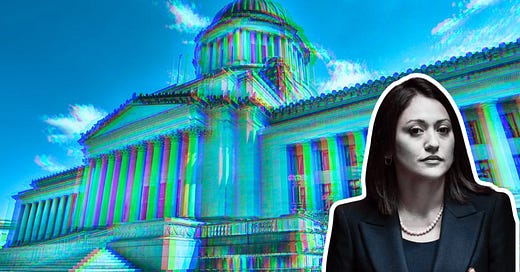Environmental crime bill that could make you a felon
Because nothing says "going green" like turning unintentional violators into criminals.
Washington Senate Democrats have passed Engrossed Substitute Senate Bill 5360, expanding criminal penalties for environmental law violations while increasing enforcement power for the state.
Supporters, led by Sen. Yasmin Trudeau (D-Tacoma), argue the bill is necessary to prevent environmental damage and hold corporations accountable. Opponents warn it could criminalize individuals and businesses who unknowingly violate complex regulations.
If SB 5360 becomes law, expect:
More businesses and individuals facing felony charges for environmental violations
Harsher penalties, including up to 10 years in prison for first-degree violations
Stronger state enforcement as Washington moves away from federal environmental oversight
Democrats claim this bill ensures accountability. Republicans say it weaponizes environmental laws and increases the risk of overregulation.
What SB 5360 does
SB 5360 expands the definition of who can be prosecuted for violating Washington’s environmental laws, including the Water Pollution Control Act, Clean Air Act, and Hazardous Waste Management Act.
The bill:
Broadens the definition of "person" to include corporations, public agencies, and cities.
Holds organizations liable for violations by their employees or agents.
Turns certain environmental violations into felonies, punishable by severe penalties.
New criminal penalties include:
First-degree violations (Class B Felony) – Up to 10 years in prison and $20,000 in fines (on par with second-degree manslaughter and gun theft).
Second-degree violations (Class C Felony) – Lower penalties but still a felony charge with prison time.
Each day a violation occurs is considered a separate offense, dramatically increasing potential penalties.
This means a business or individual could unknowingly violate an environmental rule and face multiple felony charges—one for each day the violation persists.
Why this bill is dangerous
It creates felony charges for unintentional violations
Environmental laws are already complex, with countless rules and regulations. Many businesses, local governments, and even individuals could accidentally violate these laws without any intent to cause harm.
Sen. Shelly Short (R-Addy) warned the bill could be weaponized against small businesses and individuals who unintentionally violate regulations.
Sen. Jeff Holy (R-Cheney) argued for a misdemeanor first offense, saying, “The last thing the state needs is more felons.”
Republicans tried to add protections for first-time violators, but Democrats rejected them.
It discourages economic growth and infrastructure projects
Washington already has some of the strictest environmental regulations in the country—and now, lawmakers are making it even riskier to build anything.
Sen. John Braun (R-Centralia) warned that this bill could slow down major projects under the Climate Commitment Act and the Clean Energy Transformation Act.
Developers and businesses will now face the risk of felony charges if a project inadvertently violates an environmental rule.
This makes it even harder to build homes, infrastructure, and clean energy projects in Washington.
Instead of making it easier to transition to a cleaner economy, this bill adds legal risks to businesses trying to comply.
It moves Washington away from federal environmental oversight
Supporters argue SB 5360 is necessary because they don’t trust federal enforcement under the Trump administration.
Sen. Trudeau admitted that federal enforcement under the Environmental Protection Agency (EPA) could disappear.
Instead of working with federal agencies, Washington is setting itself up as an environmental enforcer, creating stricter rules and harsher penalties.
This means the state—not the EPA—will now be pursuing felony charges for environmental violations.
Who benefits from this bill?
State environmental regulators, who gain expanded enforcement powers.
Trial lawyers, who will see more opportunities for environmental lawsuits.
Activist groups, who want stricter environmental penalties.
Who doesn't benefit?
Businesses, which will face more uncertainty and higher risks.
Local governments, which could be penalized for failing to comply with ever-changing regulations.
Workers, who may see fewer jobs in industries affected by overregulation.
This bill isn’t about holding polluters accountable—it’s about expanding government control and making compliance harder for everyone.
What’s next?
SB 5360 passed the Democrat-controlled Senate and now heads to the Washington House of Representatives for further debate.
If passed, expect:
More felony prosecutions for environmental violations.
Slower infrastructure development and job loss in affected industries.
Washington taking an even more aggressive stance on environmental enforcement.
Instead of working toward responsible environmental policies, Washington lawmakers are choosing criminalization and regulation over cooperation and innovation.




